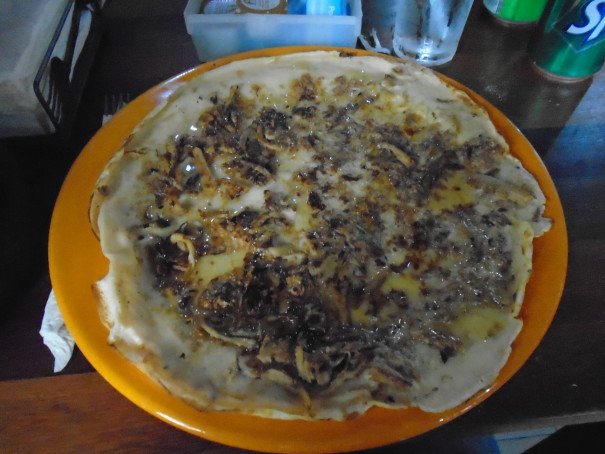
Take Heart From the Kitchen‑Sink Audacity of the True Bricolage

Take Heart From the Kitchen‑Sink Audacity of the True Bricolage
Panenkoeken in Paramaribo
When K and I arrived in Paramaribo, Suriname, we were existentially hot and hangry. For two weeks prior, we’d been in the heart of Guyana, scrambling up slick and steaming jungle hills, bathing in rocky streams, and desperately trying not to piss on/off the bullet ants that seemingly flocked to our dugout latrine. We’d come to Paramaribo (via a bumpy Cessna Caravan), because we’d heard it was more cosmopolitan and relaxed than Guyana’s Georgetown, and we needed some R&R. But more than that, we realized while stepping out onto the short Zorg en Hoop airstrip on the western fringe of town, we needed to eat something that wasn’t the generous yet monotonous porridge, sausages, and greasy bakes we’d been living on for days. Having read that Suriname still had a flare for its Dutch colonizers’ well-known pastries, we resolved to find and indulge in the decadence of a Pannekoeken Huis, a purveyor of the Dutch massive quasi-crepe creations.
We found one almost immediately, just off the mellow bend of the Suriname River. The menu instantly blew my mind. Not only was I presented with the most diverse selection of panenkoeken that I’d ever seen in my life—dozens, hundreds of varieties—but many of them were diverse fusions I’d never dared to dream. Joyfully haphazard blends of local Amerindian, African, Indian, Javanese, Chinese, Dutch, and other European ingredients, the list read like Dada poetry made from clippings of every international cookbook in your local Barnes & Noble.
I settled (almost necessarily arbitrarily) on the sateh kip met pinda samba and within minutes found myself staring with wide-eyed, slack-jawed glee at a foot-wide round of dough smothered in rough tears of chicken coated in chunky peanut sauce and spice and drizzled with honey.
Usually when I visit a nation touted for its diversity and fusion traditions, I am disappointed. Case in point: Guyana. The country bills itself as the nation of six races: African, Amerindian, Creole-Brazilian, Chinese, European, and Indian. But rather than some huge mélange, you’d be hard-pressed not to notice how segregated it feels. While not outright racist and repressive, the nation’s politics are tribal, communities are distinct, and fusion foods are muted and rare, the work of a few inventive young chefs, in comparison to the flat, monotone, universal local fare.
And this isn’t just a Guyana thing. The world over, cultural blending happens. But it’s often overblown in service of the rhetoric of unity, often to mask continued tensions, exclusions, and separation between peoples (which affect some races more than others). This trend should be old hat to Americans, used to the distance between the myth of the melting pot and our lived reality.
But now and then you find places that just feel different. You see more people from different backgrounds congregating naturally and effortlessly on the streets. You notice the neighborhoods aren’t so monochrome. You hear the hybridization of their tongues. Walking around Paramaribo I felt a bit of that at least: not a complete, blameless, and successful post-racial reality, but a mingled diversity that felt more honest and casual.
You don’t just feel that on the streets. You taste it in the food. Rather than haute fusion, you find these crazy mash-ups of flavors and phrases. You find dishes wantonly cobbled together with the casual delight and abandon I suspect one can only achieve when fully fluent in multiple food cultures. It’s less fusion than crazy gumbo. It’s fascinating, raw, and truly novel. It’s fucking chicken satay on a fucking Dutch pancake covered in fucking honey. You eat it and it makes you smile at the kitchen sink audacity that went into it. Then it knocks you out cold. Because, heavy.
I loved that sateh pannenkoek. It was far from the best meal I’ve ever eaten, but it hit the spot and it put a stupid grin on my face. It was the first signal of the calm and promise I’d find over my few days of rest in Paramaribo. I’m sure Suriname has its tensions. I’m sure not all of its cuisine is as mixed and charming as what I managed to find in a brief stint there. In fact, I know it. But anytime you find an honest bricolage, it’s some kind of signal worth celebrating. I’d go back to Suriname just for that pancake, or more dishes like it. And I’m always, when traveling, hoping I’ll stumble across something equally batshit to sink my teeth into and to love as well.